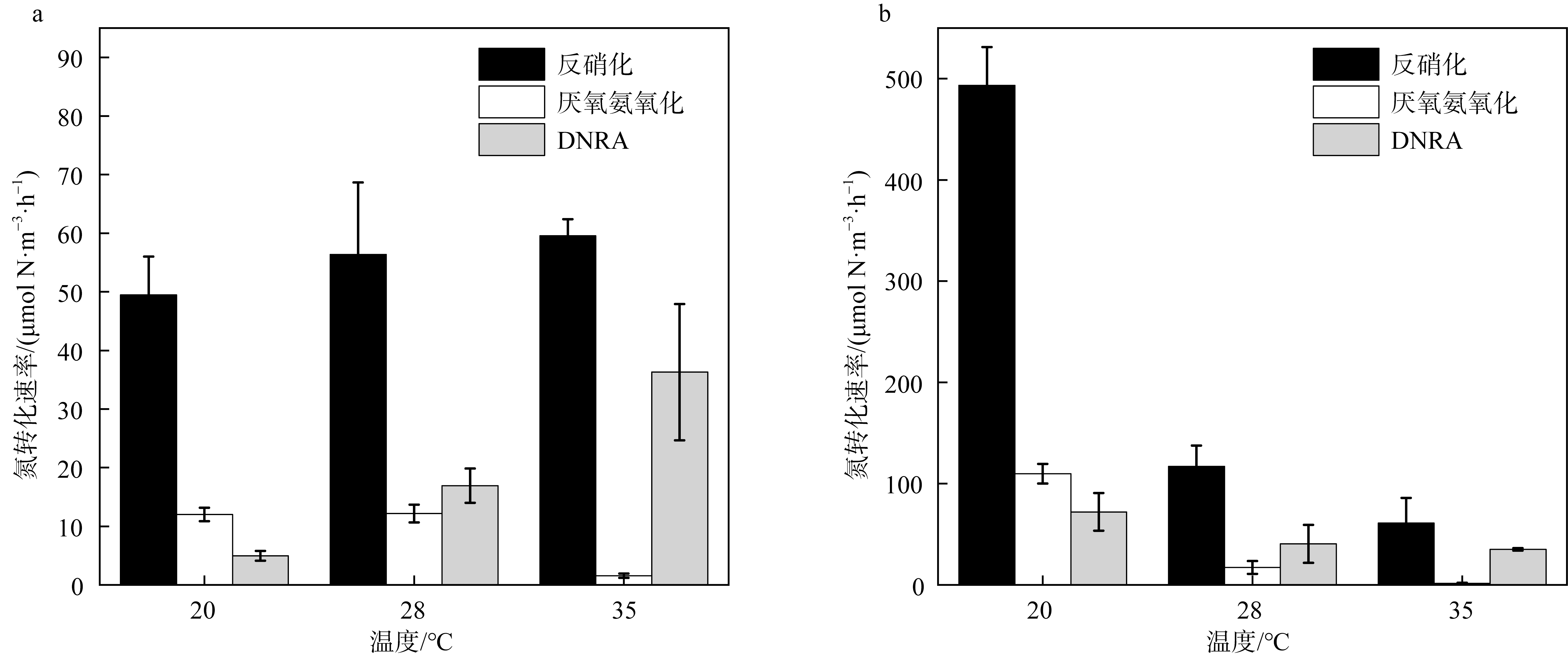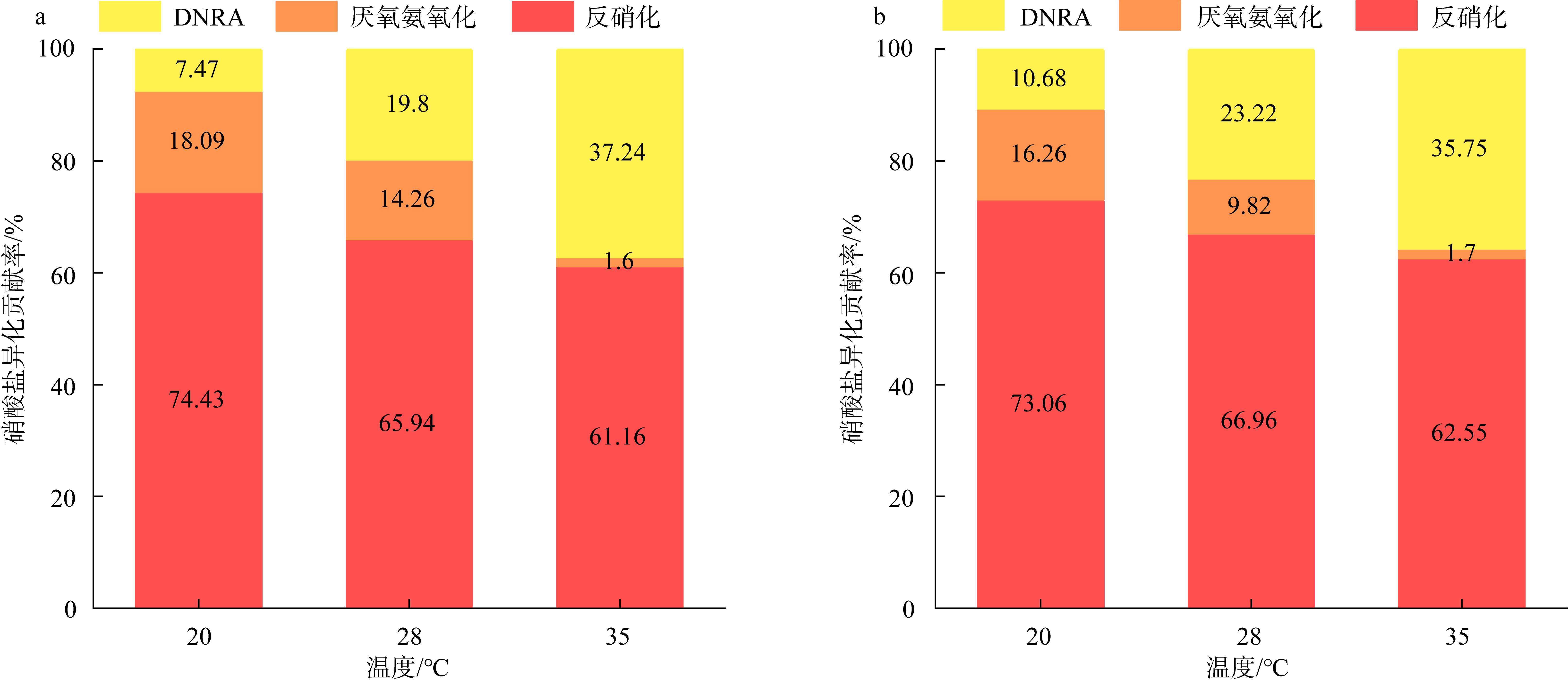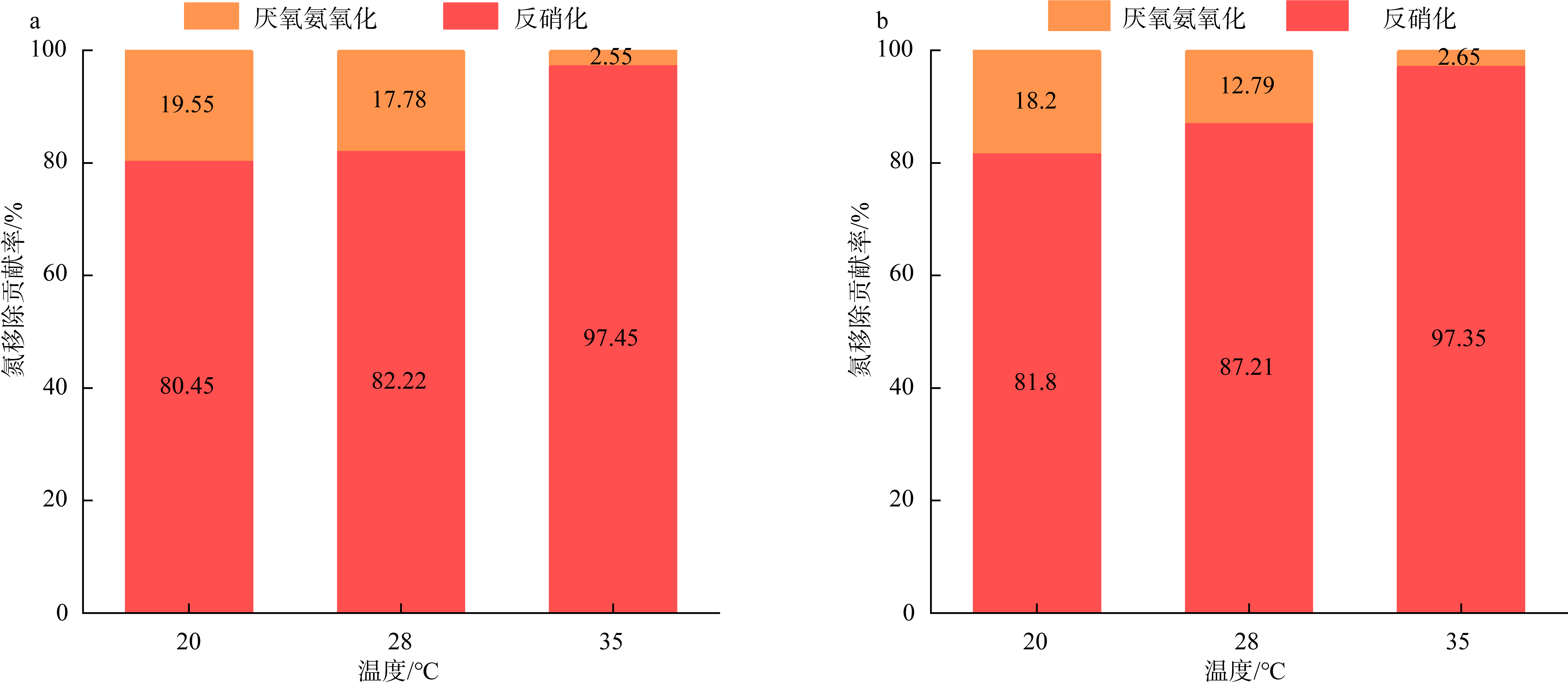| [1] |
刘祯, 郑志宏, 2022. 水体中DNRA与反硝化之间竞争研究进展[J]. 河南化工, 39(9): 4-7.
|
|
LIU ZHEN, ZHNEG ZHIHONG, 2022. Research progress of competition between DNRA and denitrification in water[J]. Henan Chemical Industry, 39(9): 4-7 (in Chinese with English abstract).
|
| [2] |
罗跃辉, 阮晓红, 李荣富, 等, 2017. 太湖西部湖区沉积物厌氧氨氧化潜在速率及其脱氮贡献研究[J]. 环境科学学报, 37(11): 4187-4194.
|
|
LUO YUEHUI, RUAN XIAOHONG, LI RONGFU, et al, 2017. The study of potential ANAMMOX rate and its contribution to the nitrogen loss in the sediments of west Taihu lake[J]. Acta Scientiae Circumstantiae, 37(11): 4187-4194 (in Chinese with English abstract).
|
| [3] |
亚涛, 2022. 温度对厌氧氨氧化系统运行特性及微生物相互作用关系的影响机理研究[D]. 北京: 北京化工大学.
|
|
YA TAO, 2022. Effect of temperature on the operation characteristics and microbial interaction in anammox system[D]. Beijing: Beijing University of Chemical Technology. (in Chinese with English abstract).
|
| [4] |
BRANDES J A, DEVOL A H, DEUTSCH C, 2007. New developments in the marine nitrogen cycle[J]. Chemical Reviews, 107(2): 577-589.
pmid: 17300141
|
| [5] |
BRIN L D, GIBLIN A E, RICH J J, 2014. Environmental controls of anammox and denitrification in southern New England estuarine and shelf sediments[J]. Limnology and Oceanography, 59(3): 851-860.
|
| [6] |
BRIN L D, GIBLIN A E, RICH J J, 2015. Effects of experimental warming and carbon addition on nitrate reduction and respiration in coastal sediments[J]. Biogeochemistry, 125(1): 81-95.
|
| [7] |
BURKEPILE D E, SHANTZ A A, ADAM T C, et al, 2020. Nitrogen identity drives differential impacts of nutrients on coral bleaching and mortality[J]. Ecosystems, 23(4): 798-811.
|
| [8] |
CANION A, KOSTKA J E, GIHRING T M, et al, 2014. Temperature response of denitrification and anammox reveals the adaptation of microbial communities to in situ temperatures in permeable marine sediments that span 50° in latitude[J]. Biogeosciences, 11(2): 309-320.
|
| [9] |
DENG FENGYU, HOU LIJUN, LIU MIN, et al, 2015. Dissimilatory nitrate reduction processes and associated contribution to nitrogen removal in sediments of the Yangtze Estuary[J]. Journal of Geophysical Research: Biogeosciences, 120(8): 1521-1531.
|
| [10] |
DEVOL A H, 2015. Denitrification, anammox, and N2 production in marine sediments[J]. Annual Review of Marine Science, 7: 403-423.
|
| [11] |
DONG L F, SOBEY M N, SMITH C J, et al, 2011. Dissimilatory reduction of nitrate to ammonium, not denitrification or anammox, dominates benthic nitrate reduction in tropical estuaries[J]. Limnology and Oceanography, 56(1): 279-291.
|
| [12] |
FALKOWSKI P G, 1997. Evolution of the nitrogen cycle and its influence on the biological sequestration of CO2 in the ocean[J]. Nature, 387(6630): 272-275.
|
| [13] |
GALLOWAY J N, ABER J D, ERISMAN J W, et al, 2003. The nitrogen cascade[J]. Bioscience, 53(4): 341-356.
|
| [14] |
HOEGH-GULDBERG O, JACOB D, TAYLOR M, et al, 2019. The human imperative of stabilizing global climate change at 1.5℃[J]. Science, 365(6459): eaaw6974.
|
| [15] |
KELLY-GERREYN B A, TRIMMER M, HYDES D J, 2001. A diagenetic model discriminating denitrification and dissimilatory nitrate reduction to ammonium in a temperate estuarine sediment[J]. Marine Ecology Progress Series, 220: 33-46.
|
| [16] |
KING D, NEDWEL D B, 1984. Changes in the nitrate-reducing community of an anaerobic saltmarsh sediment in response to seasonal selection by temperature[J]. Microbiology, 130(11): 2935-2941.
|
| [17] |
LAI T V, RYDER M H, RATHJEN J R, et al, 2021. Dissimilatory nitrate reduction to ammonium increased with rising temperature[J]. Biology and Fertility of Soils, 57(3): 363-372.
|
| [18] |
NING ZHIMING, YU KEFU, WANG YINGHUI, et al, 2019. Carbon and nutrient dynamics of permeable carbonate and silicate sands adjacent to coral reefs around Weizhou Island in the northern South China Sea[J]. Estuarine, Coastal and Shelf Science, 225: 106229.
|
| [19] |
OGILVIE B G, RUTTER M, NEDWELL D B, 1997. Selection by temperature of nitrate-reducing bacteria from estuarine sediments: species composition and competition for nitrate[J]. FEMS Microbiology Ecology, 23(1): 11-22.
|
| [20] |
QIN ZHENJUN, YU KEFU, WANG YINGHUI, et al, 2019. Spatial and intergeneric variation in physiological indicators of corals in the South China Sea: insights into their current state and their adaptability to environmental stress[J]. Journal of Geophysical Research: Oceans, 124(5): 3317-3332.
|
| [21] |
RASHEED M, BADRAN M I, HUETTEL M, 2003. Particulate matter filtration and seasonal nutrient dynamics in permeable carbonate and silicate sands of the Gulf of Aqaba, Red Sea[J]. Coral Reefs, 22(2): 167-177.
|
| [22] |
TAN EHUI, ZOU WENBIN, ZHENG ZHENZHEN, et al, 2020. Warming stimulates sediment denitrification at the expense of anaerobic ammonium oxidation[J]. Nature Climate Change, 10(4): 349-355.
|
| [23] |
THAMDRUP B, DALSGAARD T, 2002. Production of N2 through anaerobic ammonium oxidation coupled to nitrate reduction in marine sediments[J]. Applied and Environmental Microbiology, 68(3): 1312-1318.
|
| [24] |
WILD C, RASHEED M, JANTZEN C, et al, 2005. Benthic metabolism and degradation of natural particulate organic matter in carbonate and silicate reef sands of the northern Red Sea[J]. Marine Ecology Progress Series, 298: 69-78.
|
| [25] |
WOOLDRIDGE S A, 2013. Breakdown of the coral-algae symbiosis: towards formalising a linkage between warm-water bleaching thresholds and the growth rate of the intracellular zooxanthellae[J]. Biogeosciences, 10(3): 1647-1658.
|
| [26] |
YIN GUOYU, HOU LIJUN, LIU MIN, et al, 2017. DNRA in intertidal sediments of the Yangtze Estuary[J]. Journal of Geophysical Research: Biogeosciences, 122(8): 1988-1998.
|
| [27] |
ZHAO HONGWEI, YUAN MEILE, STROKAL M, et al, 2021. Impacts of nitrogen pollution on corals in the context of global climate change and potential strategies to conserve coral reefs[J]. Science of the Total Environment, 774: 145017.
|
 ), NING Zhiming1,2,3(
), NING Zhiming1,2,3( ), YANG Bin4, XIA Ronglin1, LIU Zhijin1
), YANG Bin4, XIA Ronglin1, LIU Zhijin1









